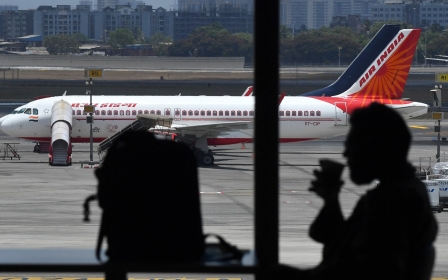In Israel, Indian pilgrims 'disappear' from religious tours to look for jobs

Indian pilgrimage tours to Israel and occupied Palestine have in recent years been used as a pathway for settlement and employment in Israel, according to news reports and several sources Middle East Eye spoke to.
Since March, at least a dozen individuals from the southern Indian state of Kerala have reportedly vanished while participating in these pilgrimage tours. Insights from tour companies indicate a recurring pattern: these missing individuals are believed to have sought asylum or employment opportunities in Israel, marking a noteworthy trend among religious tourists from the region.
As of February 2023, the Indian embassy in Tel Aviv has estimated that around 18,000 Indian citizens are residing and working in Israel, a significant portion of whom are employed as caregivers for elderly Israelis.
Miriam Anati, an outreach and resource development staff member at the Israeli workers' rights NGO Kav LaOved, said her group was not aware of the phenomenon of vanishing pilgrims seeking asylum.
"I have not heard of this phenomenon as such, but at Kav LaOved we do encounter at times workers from developing countries in similar situations.
New MEE newsletter: Jerusalem Dispatch
Sign up to get the latest insights and analysis on Israel-Palestine, alongside Turkey Unpacked and other MEE newsletters
"What's most concerning is when criminal organisations that make huge amounts of money on the backs of workers are involved, in both the workers' home countries and in Israel, and the risk that heavily indebted workers might end up in horrible situations.
"We do meet workers, both regular and irregular workers, who are victims of abuse and/or trafficking, and help them get out of these situations."
Marina Polinovsky, who works at Kav LaOved's caregivers department, said: "Some people may come to Israel as tourists or pilgrims and stay and work illegally; it's not specific to Indians.
"There are immigration lawyers who submit asylum requests, and while the request is being processed the asylum seekers can work. But usually those requests are denied after a few months, as they are without merit."
Borgian Solomon, a caregiver from Kerala who reached Israel in 2008, said that the pilgrims visit Israel on a B2 single entry visa valid for three months, then overstay their visas while seeking work opportunities.
Israel is increasingly becoming a migration destination for multiple reasons, according to V J Varghese, an associate professor in history at the University of Hyderabad who studies transnational migrations from Kerala, noting that Israel is not on the Emigration Check Required (ECR) countries list in India.
"Unlike 17 other destinations, Indians don't need emigration clearance from the Protector of Emigrants to migrate to Israel for work," he told MEE. "Israel also offers better wage rates and relatively better working conditions."
Asked as to why they migrated from Kerala, a relatively prosperous and literate state with no history of major calamities and civil wars, Varghese said: "Migration is not purely determined by poverty. States like Kerala, Punjab and Gujarat, where large-scale migration happens, are not the poorest Indian states. Migration requires a strong network of migration, a capacity to pay for migration, and aspirations conditioned by a long migration culture."
Tourism exploited by smugglers
Suraj Rajan Kadanthodu, an Israel Studies researcher at the University of Haifa focusing on Indian Jewish communities, said those who seek asylum from Kerala are usually Christians, though he pointed out that, while this phenomenon is relatively uncommon among Muslims, the trend has undergone a change since March.
Reports have surfaced regarding the disappearance of four Muslim tourists from Kerala during a tour in Israel. These individuals, all above 50 years of age and including a woman, went missing on 7 March.
Jaleel Mankarathodi, the proprietor of Green Oasis Tours and Travel Services based in Malappuram city, Kerala, told Middle East Eye that suspicions never surrounded this family consisting of a father, mother, son, and father-in-law of the son. In a similar incident in July, a subsequent disappearance led the Israeli destination management company to detain the entire tour group and charge Mankarathodi's agency $20,000 for each of seven missing people.
Mankarathodi believes that his reputation and services, and those of fellow businessmen, were exploited for people-smuggling. He told MEE that the destination management company is legally required to pay a large deposit for the interior ministry as a guarantee against the possible departure of some tourists from the organised trips when they want to avoid returning to their country of origin.
In February, the Kerala state government experienced a situation in which a farmer taking part in a government-sponsored tour to Israeli farms disappeared for several weeks. Eventually, he reappeared at home following pressure from the state authorities on his family.
Well before this incident, 50 fishermen from Kerala were deceived in 2010 into embarking on a pilgrimage route with the hope of finding jobs in Israel, only to find themselves incarcerated in Israeli jails before being deported as they were unable to provide evidence of valid visas.
This marked the beginning of a trend that grew stronger over time, largely away from the media spotlight.
Kadanthodu, the researcher, became aware of this phenomenon in 2018.
"I was returning to Kerala after a summer school in Israel. At Ben Gurion Airport, I met two workers from Kerala. They said they had jumped on a pilgrim group and later acquired UN refugee status, with which they could work and earn money in Israel. They claimed they earned 4,000-5,000 shekels [$1,000-$1,300] a month."
MEE couldn't independently verify the plausibility of the account of the two workers.
Still, many in Kerala suggest the existence of "a ring" in Tel Aviv capable of helping Indian tourists to legalise their residence status.
Multiple travel groups told Kerala media that they lost people in Israel near eateries where there were no security cameras.
Mankarathodi said his own investigation revealed smuggling rings from Kerala's two southernmost districts colluding with a network in Tel Aviv.
He said he was "stunned by the audacity of people who vanished" from his tours. "Whole families have fled tours and left their passports behind," he told MEE. "No one does that daredevilry without enough assurances and testimonials of success.
"These rackets charge $5,435 to $6,038 per person. After paying us a travel package fare of $1,570, they pocket a huge illegal profit."
Mankarathodi said he became aware of the practice only after two incidents involving his agency in three months.
"People told me that, on average, a pilgrim tour misses one to four people in Israel. The practice flourished in an omerta culture because agencies have a reputation to protect."
He pointed out that people-smugglers take advantage of the reputation of the religious nature of these trips.
Catholic priest Fr George Joshua said he has been organising tours since 2006, and not a single such incident happened until February, when six of his 25-member group went missing.
"I have always had hassle-free passages at Israeli touchpoints because of the integrity and credibility built over the years. I lost them all," he said in a video interview earlier this year.
This article is available in French on Middle East Eye French edition.
Middle East Eye delivers independent and unrivalled coverage and analysis of the Middle East, North Africa and beyond. To learn more about republishing this content and the associated fees, please fill out this form. More about MEE can be found here.




